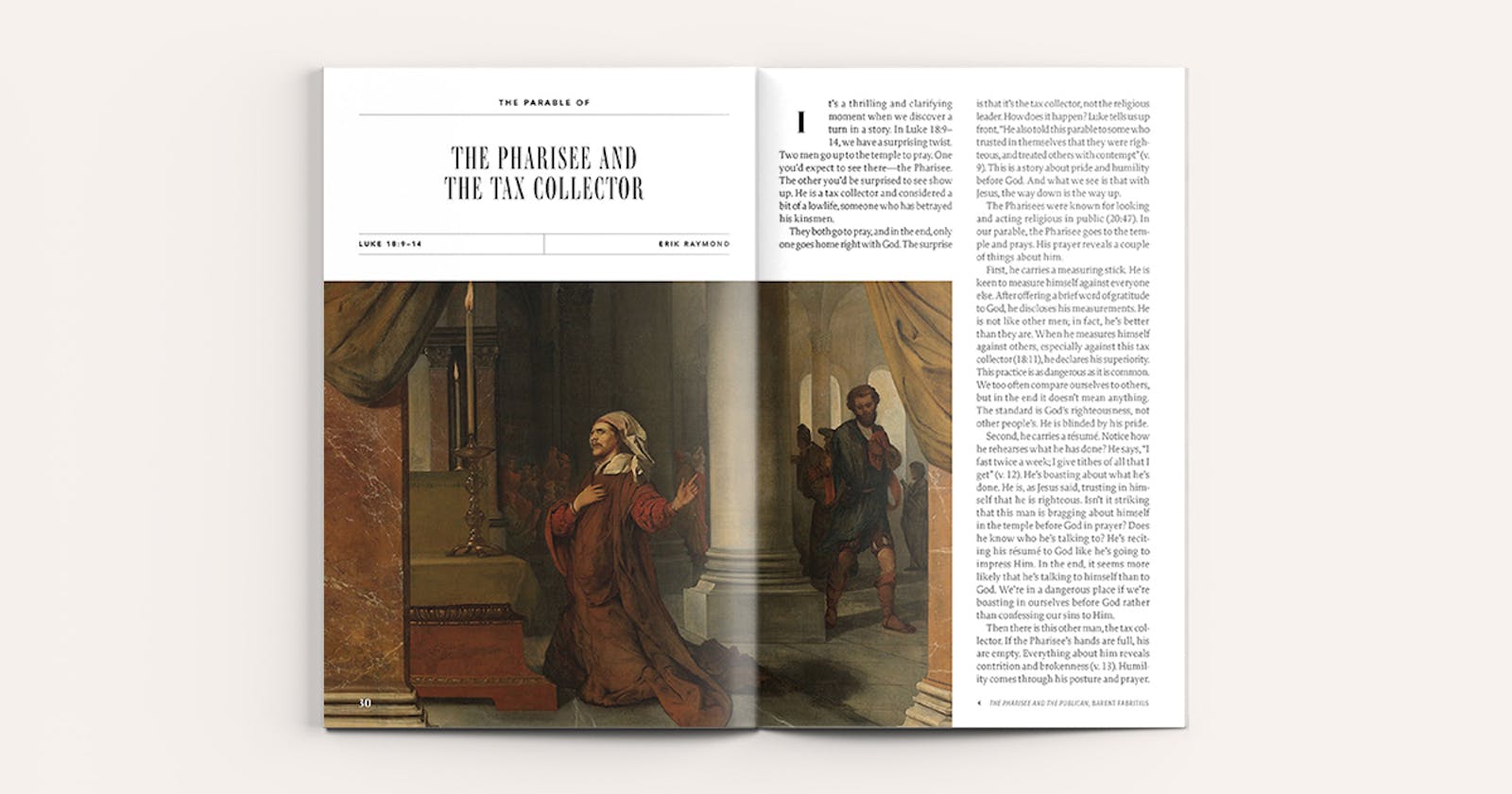
Request your free, three-month trial to Tabletalk magazine. You’ll receive the print issue monthly and gain immediate digital access to decades of archives. This trial is risk-free. No credit card required.
Try Tabletalk NowAlready receive Tabletalk magazine every month?
Verify your email address to gain unlimited access.
It’s a thrilling and clarifying moment when we discover a turn in a story. In Luke 18:9–14, we have a surprising twist. Two men go up to the temple to pray. One you’d expect to see there—the Pharisee. The other you’d be surprised to see show up. He is a tax collector and considered a bit of a lowlife, someone who has betrayed his kinsmen.
They both go to pray, and in the end, only one goes home right with God. The surprise is that it’s the tax collector, not the religious leader. How does it happen? Luke tells us up front, “He also told this parable to some who trusted in themselves that they were righteous, and treated others with contempt” (v. 9). This is a story about pride and humility before God. And what we see is that with Jesus, the way down is the way up.
The Pharisees were known for looking and acting religious in public (20:47). In our parable, the Pharisee goes to the temple and prays. His prayer reveals a couple of things about him.
First, he carries a measuring stick. He is keen to measure himself against everyone else. After offering a brief word of gratitude to God, he discloses his measurements. He is not like other men; in fact, he’s better than they are. When he measures himself against others, especially against this tax collector (18:11), he declares his superiority. This practice is as dangerous as it is common. We too often compare ourselves to others, but in the end it doesn’t mean anything. The standard is God’s righteousness, not other people’s. He is blinded by his pride.
Second, he carries a résumé. Notice how he rehearses what he has done? He says, “I fast twice a week; I give tithes of all that I get” (v. 12). He’s boasting about what he’s done. He is, as Jesus said, trusting in himself that he is righteous. Isn’t it striking that this man is bragging about himself in the temple before God in prayer? Does he know who he’s talking to? He’s reciting his résumé to God like he’s going to impress Him. In the end, it seems more likely that he’s talking to himself than to God. We’re in a dangerous place if we’re boasting in ourselves before God rather than confessing our sins to Him.
Then there is this other man, the tax collector. If the Pharisee’s hands are full, his are empty. Everything about him reveals contrition and brokenness (v. 13). Humility comes through his posture and prayer. He stands far off because he is separated from God because of his sin. He’s ashamed of his sin, so he won’t even lift his eyes to heaven. He continues to beat his chest to demonstrate his sorrow. He cries out to God for mercy because he knows he’s a sinner who desperately needs it.

How different is he from the Pharisee? Instead of looking to himself for righteousness, the tax collector pleads to God for mercy—because he has no righteousness. Even the way he pleads conveys his humility. The plea for mercy is a cry for God’s anger to be removed righteously and graciously (literally “be propitiated!”). We see this convicted sinner humbled in the temple. His chest is red from his pounding it in despair, his voice is hoarse from crying for mercy, and his head is down.
Jesus concludes the story by telling us that “this man went down to his house justified, rather than the other. For everyone who exalts himself will be humbled, but the one who humbles himself will be exalted” (v. 14).
The Pharisee had his hands full of self-righteousness. The tax collector had empty hands. But it was the tax collector who went home justified. He was declared righteous in God’s sight. No one will ever be counted righteous in God’s sight by trusting in himself. The only way to stand righteous or perfect in God’s sight is by trusting in the righteousness of another. The man telling the parable, Jesus Himself, earned the righteousness that is counted to believers as it is received by faith (Rom. 5:1; 2 Cor. 5:21). It is humbling to realize that we have nothing to offer God. But it is quite an occasion of rejoicing to realize that everything we need is found in Christ. In this way, the humble are exalted.
